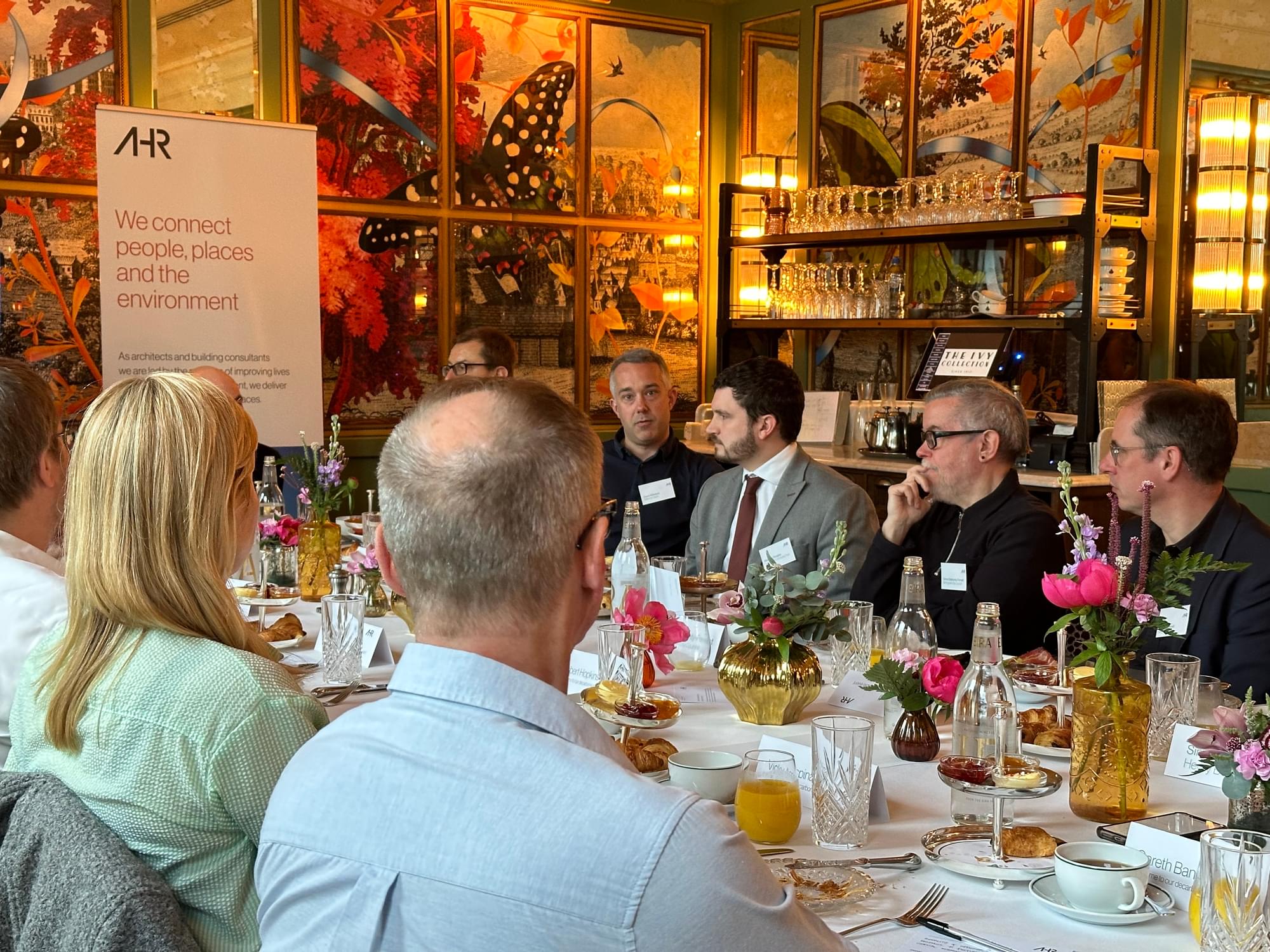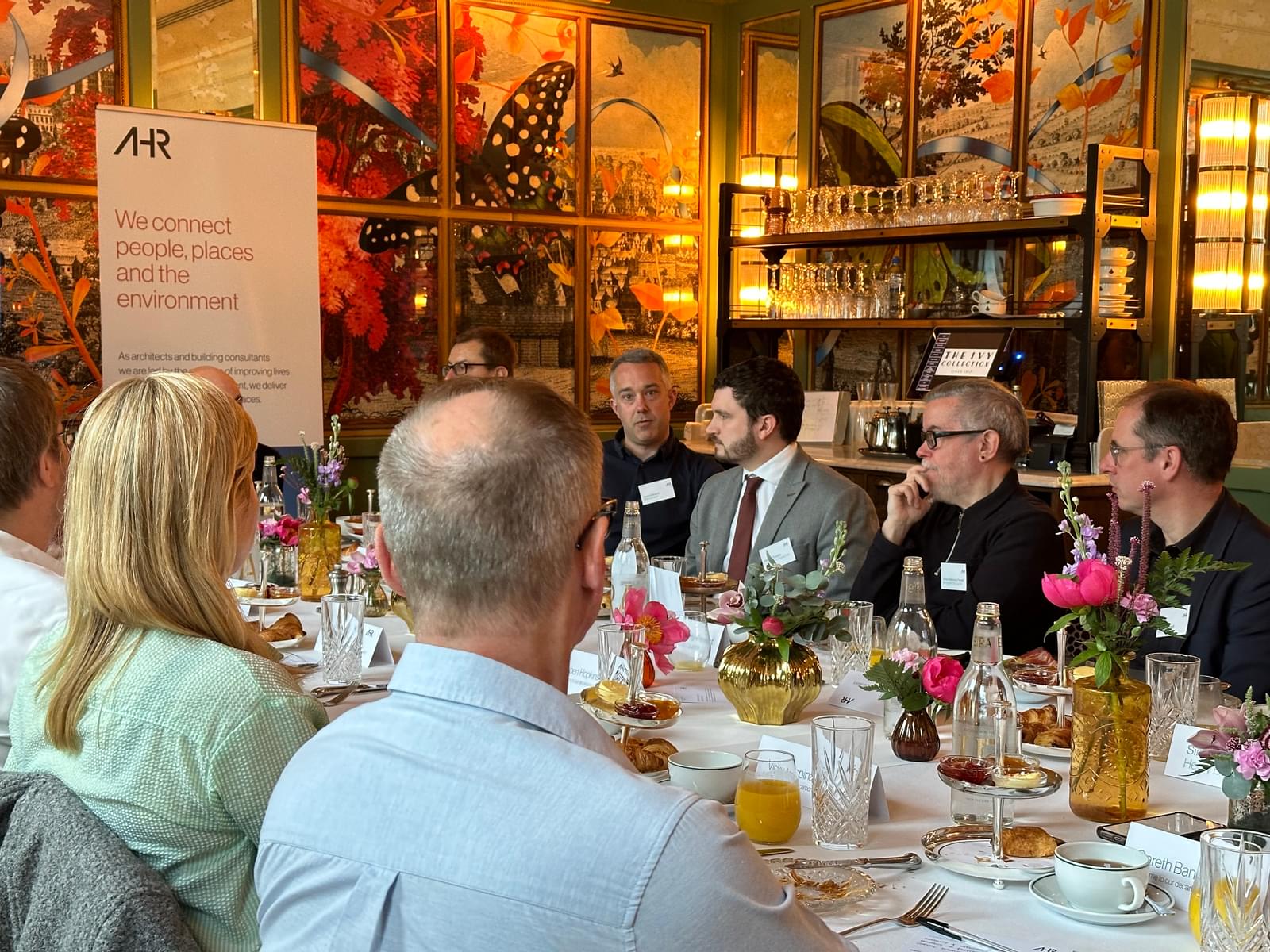Practice News
Achieving decarbonisation: Continuing the conversation in Birmingham
by AHR

We began our 2024 decarbonisation roundtable series in Birmingham where we were joined by industry friends, eager to discuss and explore challenges and opportunities of decarbonisation and how we are navigating forthcoming changes in building performance standards and legislation.
We were delighted to welcome representatives from Birmingham City Council, Cushman & Wakefield, Glenbrook Property, Henry Boot Development, IM Properties, JLL, Prince Albert Community Trust and Willmott Dixon.
All of whom participated in another insightful conversation, reflecting on our progress in decarbonisation initiatives and a reminder of our shared journey towards a sustainable future.
Regardless of our individual positions on this journey, collaboration and knowledge sharing is key to reaching our shared goal.”
Robert Hopkins
Director and Sustainability LeadInteresting points emerged, including advocating for government regulations and incentives to sustain progress, acknowledging sector disparities and the importance of bridging the gap between cost and value in sustainability initiatives.
We also identified the need for clarity around the language and terminology surrounding sustainability. With clear communication, we empower everyone to actively participate in implementing impactful policies that reflect our shared values and aspirations.
Read on to uncover more insights that were shared during the event.
1. The challenges of progress; reversing policies isn’t helping, but we need to be realistic
Maintaining a positive outlook is crucial, but it’s hard to deny our shared frustrations. Recently, we’ve seen Scotland scrap its annual and interim targets for cutting greenhouse gas emissions, replacing these with a system measuring emissions every five years. Whilst the Scottish Government still insists the 2045 net zero carbon target remains on track, there is still reluctance from leaders in prioritising actionable steps. The UK Government is slipping back whilst others around the world are accelerating, especially with its reversals on key climate policies like delaying the ban on sale of new petrol and diesel cars.
Where the UK Government is scaling back, organisations are being urged to continue on the journey. An example being the growing importance for businesses to disclose their Scope 3 greenhouse gas emissions as a key step in contributing to the Government’s net zero target.
Though it’s important that we remain optimistic, something which was a key focus point in our discussions. There was a consensus that we must acknowledge these challenges and work together to achieve them. One participant even found it ‘refreshing’ to discuss these obstacles openly, highlighting transparency in working towards these targets.
2. Running at different paces; reminding ourselves that it’s a journey not a race
There was a consensus that there is still a disparity between the sectors in attitudes towards implementing sustainable initiatives. This is largely influenced by varying perspectives and priorities. For instance, generally, the office and workplace sector demonstrates a strong commitment, driven by occupier demands to meet Environmental, Social and Governance (ESG) requirements and regulatory pressure to achieve the relevant EPC ratings.
The residential sector poses its own challenges. A significant barrier stems from the prevalent disconnect between cost and the value of energy saving initiatives. Many individuals and businesses in the sector hesitate to invest in sustainability initiatives initially due to concerns about capital costs. However, bridging this gap and clearly highlighting the long-term benefits of such investments early on could pave the way for meaningful change.
Intuitive and user-friendly innovations such as our Retrofit Toolkit, also play a crucial role. The toolkit helps individuals and businesses make informed decisions in prioritising decarbonisation plans, whether for single assets or entire estates, supporting them to reduce energy usage.
3. Technology and innovation; embracing emerging and existing technologies
It became evident that some organisations are exploring AI to boost decarbonisation efforts. For instance, tools are being implemented to help occupiers in managing their building stock more efficiently. These tools can pinpoint areas where energy consumption can be reduced while ensuring comfort, keeping tenants satisfied and energy usage minimised.
We have fantastic technology at our disposal to support our efforts to become more environmentally conscious. The discussion revealed exciting opportunities for us to innovatively use the technology we have already to create more solutions.
Our mobile phones accompany us through every aspect of our daily lives, offering numerous opportunities, such as monitoring a building’s energy performance. Delivering information straightforwardly can create a clearer, easily understood narrative, prompting meaningful shifts in attitudes and behaviours.
4. Talking sustainability; clarity is needed to push objectives and include the masses
When we think about the future of our towns and cities, there lies a great commitment to inclusivity. Without it, there is the risk of marginalising certain members of society. Part of thoughtful and meaningful placemaking is to work with citizens to ensure the overall vision is reflective of local peoples’ needs and aspirations for the place they call home.
As echoed earlier on, there is still confusion around what we actually mean when we say we are on track for a net zero carbon future. And for many, this journey looks very different and requires varying levels of interventions and solutions.
By remaining inclusive, and providing more commonality regarding the terminology we use, we have a greater chance at influencing the masses, and bringing them along this journey with us toward a brighter, more sustainable future.
To learn more about how we are achieving decarbonisation through retrofit, visit our perspectives page here.
Share on
Related Articles
Practice News
Achieving decarbonisation: Sharing insights and experiences in Birmingham
We headed to Birmingham for the fourth of our Achieving Decarbonisation roundtable events, where industry friends joined us to discuss the challenges and opportunities in retrofit.
Date: 12 Dec 23
by AHR

Practice News
Achieving decarbonisation: The challenges and opportunities in retrofit
In our Achieving Decarbonisation roundtable series, we sat down with colleagues from across the industry in Manchester to discuss the challenges and opportunities in retrofit.
Date: 12 Jul 23
by AHR
Practice News
Achieving decarbonisation: What emerged during our roundtable discussion in Cardiff
In the third of our Achieving Decarbonisation roundtable series, we discussed retrofit and the challenges and opportunities it presents with our industry colleagues from Cardiff.
Date: 29 Nov 23
by AHR

Practice News
Continuing the conversation: Exploring pathways to achieve decarbonisation
In the second of our Achieving Decarbonisation roundtable series, we discussed retrofit and the challenges and opportunities it presents with our industry colleagues from Liverpool.
Date: 3 Oct 23





